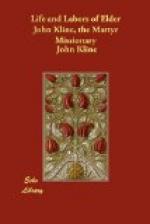PART II OF INTRODUCTION.
This book, if carefully read, will instruct both young and old. In this age of progress, when the forces of nature and art are being applied to practical ends; when “men are running to and fro and knowledge is wonderfully increased,” it becomes us as intelligent Christians to look around and see whether we are not living in perilous times.
Far be it from me to discourage any one from seeking that knowledge which is good, or from availing himself of the benefits to be derived from the arts and sciences; but if this knowledge and these benefits are sought and gained only for worldly ends, only to add to worldly accomplishments or worldly treasure, they are dangerous for time and ruinous for eternity. What support can the soul have in its deep conflict with temptation, or in the dark hour of affliction or bereavement, when stayed on this world only? In all the tenderness of a father’s heart I turn to the youth of our land and say to them in the words of the best Friend that God himself could give: “Seek first the kingdom of God and his righteousness,” and all earthly blessings will be added unto you.
In the following pages you may see what one man may do by “patient continuance in well doing.” Brother Kline was a man “subject to like passions as we are.” He was once an infant just as you were, and lay at his mother’s breast. He very well remembered, when an old man, how he felt when she made for him his first pair of “pants.” When that kind mother put them on him, pleased and smiling in the tenderness of her nature, “the first use that I made of my hands,” said he to me shortly before his death, “was to feel for the pockets.” “We incline,” continued he, “to carry this feature of our boyhood into youth and age. The pocket never ceases to be a very important appendage to our dress, and the hand inclines to put into it every valuable thing it can.”
Brother Kline never went to school very much. He learned to read and write both German and English; and he also studied arithmetic. Further than this he never went in school. He did not have the advantages of free schools as young people now have. But you may learn from this that one may carry on his education after leaving school. In fact, schools only open the way for acquiring an education.
When a boy I was very fond of reading the lives of great men. I did not then know very much about poetry, but I surely did feel something of the fire that Longfellow has made to glow with so much heat and light in his “Psalm of Life.” I am glad to add, by means of this book, one more name to the list of great men, so that in the lines which follow he too may be included.
“Lives of great men all
remind us
We can make our lives sublime;
And departing, leave behind us
Footprints on the sands of
Time:
Footprints, that perhaps another
Sailing o’er life’s
troubled main—
A forlorn and shipwrecked brother—
Seeing, may take heart again.”




